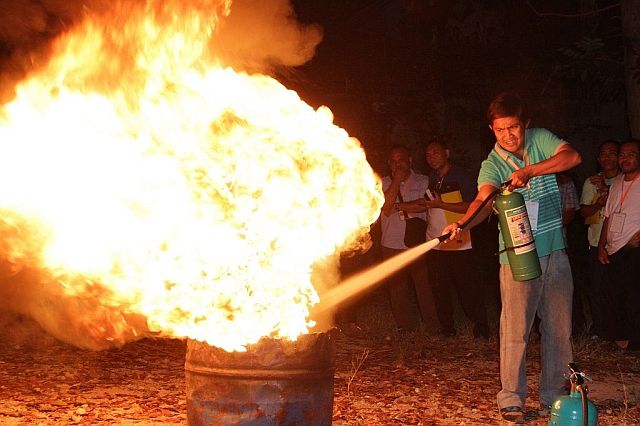
Smart’s disaster preparedness training in Cebu include fire prevention and safety. (CONTRIBUTED)
Resident of Madridejos in Bantayan Island were armed only with basic information on disaster when Supertyphoon Yolanda hit their community on Nov. 8, 2013.
This prompted Louigie Escala of Madridejos town to attend a seminar to enhance his knowledge on disaster preparedness.
The Disaster Preparedness Training was organized by Smart Communications last March 29-30 for the seven ecclesiastical districts of the Archdiocese of Cebu at the Schoenstatt Shrine in Talisay City.
The seminar tackled weather disturbances and forecasts, cataclysms like earthquakes and after effects like tidal waves and tsunamis, typhoons and accompanying storm surges and landslides.
Escala said the most important learnings on disasters were those that involved assessing an area’s susceptibility, reducing risks to the community, and coming up with a plan of action.
Disaster response
The two-day training, organized in coordination with the Commission on Service of the Cebu Archdiocese, was a follow through for a similar one that Smart conducted for the clergy, said Atty. Maria Jane Paredes, Smart Public Affairs manager for the Visayas and Mindanao.
Paredes said the seminar aimed to form disaster risk and response coordinating councils for the seven church districts in Cebu. She added that the representatives from the ecclesiastical districts will then relay what they’ve learned to the vicariates and parishes, which will then form their own disaster coordinating groups that will serve to complement the efforts of local government units.
“It’s about educating people so they are prepared when calamities occur. The church has an organization down to the last chapel and the capability to reach even the most remote families,” she added.
“With more people getting affected by worsening calamities, there is a vital need to make available a template that would prepare communities and make them safer in the face of disasters like typhoons and earthquakes,” said Dr. Cedric Daep, chief of the Albay Public Safety and Emergency Management Office.
Death penalty
Daep talked about disaster risk reduction and preparedness and how they were able to institutionalize measures in his province during the seminar. Albay in the Bicol Region hosts an active volcano and is right in the path of tropical cyclones.
“If our efforts are not complementary, it will not work. There must be community participation. You should learn what to do in case of disasters so that you are safe even if government fails to do its job. Not knowing what to do during calamities is a death penalty,” he told the participants of the training.
According to him, the central philosophy of a culture of reduction is to remove the risk so it results in zero damages and casualties and does not require a response but it involves strictly sticking to a land use plan and requires government and the private sector working together.
Vulnerable areas
Fr. Socrates Saldua of the Archdiocesan Commission on Service said that while local governments have a program on disaster readiness, it hasn’t gone down to the grassroots mostly due to political differences.
“This is why we have come up with an alternative. Cebu Archbishop Jose Palma understands the problem and agrees to have teams that can focus on the most vulnerable areas of Cebu,” Saldua explained.
Saldua said they were grateful to Smart for extending their help by sharing connections and resources for the two-day seminar.
conserve environment
Pagasa Mactan chief meteorologist Oscar Tabada said rivers and springs in Cebu are drying up while crops are dying because of the absence of rain and water shortage brought about by El Niño.
The drought, which will continue up to May in Cebu based on monitoring by the weather bureau, is just one of the effects and threats of the global climate change.
According to Tabada, another consequence will be stronger tropical cyclones. He added that in light of these developments, people should help reverse climate change by doing what they can for the environment but at the same time prepare for worsening natural disasters. /PR
Disclaimer: The comments uploaded on this site do not necessarily represent or reflect the views of management and owner of Cebudailynews. We reserve the right to exclude comments that we deem to be inconsistent with our editorial standards.
